Back in February, who would have thought that those three little letters, PPP, would come to define the business culture for small and medium-sized businesses throughout the country? The Paycheck Protection Program and the alliterative phrase, “The PPP,” have given millions of American business owners hope through this COVID-19 pandemic, while also causing unknown liabilities for business owners already struggling to see the future. After such immediate popularity, the time has come to see if this massive infusion of government cash worked as planned, or if the PPP loans will indeed be a burden on the backs of businesses for years to come.
What comes next?
With the forgiveness process now open, accountants, tax professionals and auditors are working around the clock to submit forgiveness applications on behalf of their clients. Without forgiveness, millions of businesses will be saddled with debt they cannot afford and otherwise likely would not have borrowed. The impact of mass non-forgiveness will likely be another major obstacle to economic recovery. Thus, the pressure is on lenders and the Small Business Administration to forgive as many of the loans as legally possible.
There are several steps that you can take to aid companies to increase the likelihood of PPP loan forgiveness:
1. Be thorough. Submit a PPP loan forgiveness application that is clear and contains all the supporting information. Accountants should outline the basis for their calculations. Remember, temporary employees not experienced in financial reviews will be considering many of these applications on behalf of lenders and the SBA.
2. Be conservative. Remember, recent guidance has allowed more flexibility on the timeframe to spend the loan. If using a shorter time frame makes your calculations too close for comfort, extend your review period. For example, rather than use a questionable utility expense, just include one additional payroll for qualifying employees.
3. Be educated. After reviewing the guidance provided by the SBA, go over it in detail with your clients. Each business is unique and benefits from different parts of the guidance. It is cumbersome and complex, but knowing the rules will make completing the forgiveness application process much smoother.
Being prepared for any outcome is prudent while waiting on PPP loan forgiveness. Accountants should work with business owners to answer the following questions: How will the company repay the loan if it is only forgiven in part? What budgetary steps can they take at this time to prepare for that possibility? Are they eligible to negotiate extended repayment terms with their lender if any portion of the PPP loan is not forgiven? Knowing how the business would respond to these complex questions will allow them to start conserving the cash necessary to meet the obligations.
While working on PPP loan forgiveness, business owners should discuss with their finance teams several other matters to capture all of the benefits of COVID-19-related legislation. Capturing the PPP loan and its forgiveness on their financial statements is an important consideration for business leaders, particularly if the loan was received in 2020 but forgiveness does not occur until 2021. Additionally, if the business has stopped considering payroll for PPP loan forgiveness, be sure they are taking advantage of all the other payroll-related tax benefits of the CARES Act.
PPP loan recipients are ubiquitous among small and medium-sized businesses. Many vendors, customers, competitors and service providers are likely facing similar issues. As a member of a company’s business circle, be available to help manage this process. With your expertise, diligence and focus, most PPP loans will be forgiven. The positive impact on the economy as more businesses successfully navigate this process will cement the PPP as a source of hope in dark times, and erase the fear of the business community as they look to build a new future.





